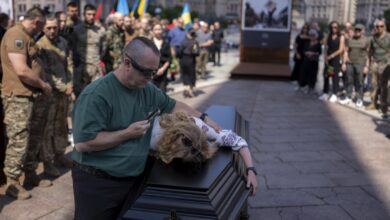Vatican excommunicates Archbishop Viganò for refusing to recognize pope

[ad_1]
Viganò’s punishment suggests that Francis, who has faced conservative criticism since early in his papacy, may be losing patience with his sharpest critics in the church hierarchy who have challenged his papal authority in sometimes shocking and irreverent terms. It is also an indication of how Viganò has morphed over the years from a being a critic of the pope and the church’s shortcomings on dealing with clerical abuse into a fringe conservative firebrand who has embraced conspiracy theories and recently retweeted a post from Rep Marjorie Taylor Greene (R-Ga.), claiming that “the covid vaccines are killing people.”
The Vatican’s decision came after its disciplinary body, the Dicastery of the Doctrine of the Faith, had issued a formal decree June 20, assigning the senior cleric to a penal canon trial for the “crime of schism” and “denial of the legitimacy of Pope Francis.”
“His public statements manifesting his refusal to recognize and submit to the Supreme Pontiff, his rejection of communion with the members of the Church subject to him, and of the legitimacy and magisterial authority of the Second Vatican Council are well known,” the Dicastery of the Doctrine of the Faith said in statement. “At the conclusion of the penal process, the Most Reverend Carlo Maria Viganò was found guilty of the reserved delict of schism.”
The summary judgment by the Vatican can only be undone by a ruling of the pope or the Dicastery of the Doctrine of the Faith acting in his name. The excommunication means that Viganò cannot officially accept Catholic sacraments including Communion, ordain priests or officiate Mass.
He does not immediately lose his clerical title, though such a step — known as defrocking — could follow if he is deemed to be unrepentant, experts say. In 2006, for instance, the Vatican under Pope Benedict XVI excommunicated Emmanuel Milingo, a Zambian archbishop, who married a South Korean woman in a ceremony inside the Unification Church of Sun Myung Moon, conducted unauthorized exorcisms and established a movement for married priests. Three years later, he was defrocked.
That step was probably not taken now “in the hopes that [Viganò] may repent,” said Davide Cito, a canon lawyer and deputy rector at Rome’s Pontifical University of the Holy Cross.
For Viganò, repentance, at least for now, seems unlikely. The 83-year old Italian prelate did not even appear at his own trial, arguing that he did not recognize the authority of Francis or the Vatican officials under him to hold him accountable. On Friday, he posted on X that, as he does every month, he would say Mass for supporters in defiance of the Vatican’s ruling. He also called for “donations” to his Exsurge Domine foundation, which is offering “traditional training” to six seminarians, he said.
The crime of schism is defined as a rupture with the church’s “unity” under the pope. The Vatican cited Viganò’s public statements that have “resulted in a denial of the elements necessary to maintain communion with the Catholic Church,” as well as his rejection of Francis’s “legitimacy” and the reforms laid out by the Second Vatican Council of the 1960s.
Though church codes require clerical fealty, Francis has largely tolerated dissent for years. That, however, has begun to change, especially since the pope’s appointment last year of Cardinal Víctor Manuel Fernández — a fellow Argentine and a longtime ally of Francis — as the new head of the Vatican’s disciplinary arm.
Since Fernandez’s appointment last summer, the Holy See has acted more swiftly to defend the pope. A major Francis critic, Bishop Joseph Strickland of Tyler, Tex., was stripped of his diocese, while another longtime critic, American Cardinal Raymond Burke, lost his pension and Rome apartment.
Among the pope’s critics, though, Viganò was in a league of his own.
He was recalled as U.S. ambassador, or apostolic nuncio, in 2016 amid allegations that he’d gotten caught up in the political fight against same-sex marriage. Two years later, he made headlines with a bombshell letter that latched on to a vulnerability of the church — its record of dealing with sexual abuse cases — to accuse Francis of misconduct. Francis, he asserted, had ignored early warnings about Cardinal Theodore McCarrick, the former archbishop of Washington, D.C., who had just resigned from the College of Cardinals.
Three weeks before the Vatican announced Viganò’s trial, he published fresh allegations on X claiming that Francis had committed the “same abuses” as McCarrick when serving in a senior church position in Argentina. He again offered no evidence.
Viganò appeared to escalate his missives after a December ruling, authorized by Francis, allowing Catholic priests to conduct short blessings of people in same-sex relationships. He referenced the ruling in his lengthy response to the trial, writing, “Bergoglio authorizes the blessing of same-sex couples and imposes on the faithful the acceptance of homosexualism, while covering up the scandals of his protégés and promoting them to the highest positions of responsibility.”
[ad_2]
Source link




